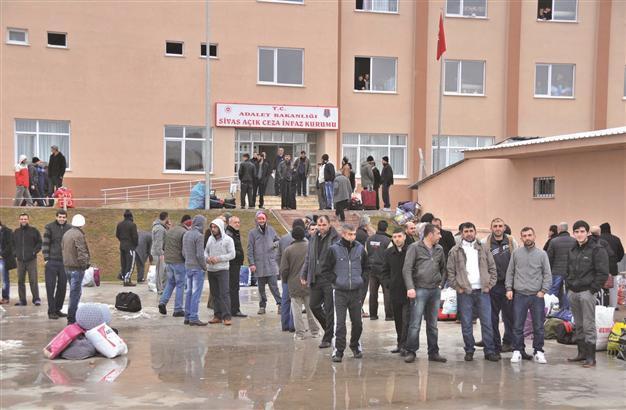Hard to understand EU officials, Turkish justice minister says
ANKARA - Hürriyet Daily News

Convicts are released on probation from a prison in the central province of Sivas as part of recent judiciary reform in this file photo. DHA photo
Turkish Justice Minister Sadullah Ergin has criticized the European Union for poor cooperation with Ankara concerning its demands over reforms to the country’s judicial system, in talks regarding the country’s accession to the union.
Turkey has not received an inspection report on the matter from the EU, Ergin said, speaking at the European Parliament in Brussels during the annual conference of Insight Turkey magazine, produced by the Foundation for Political, Economic and Social Research (SETA).
Turkey is “trying to build a road map by pushing the limits and observing the body language of EU officials sometimes,” Ergin said, likening the 27-member bloc to “a doctor asking why a patient does not use the required medication but without writing out a prescription.”
The criteria to start official talks on the 23rd chapter, which is about the judiciary and fundamental rights, have not yet been submitted to Turkey, the minister noted. The chapter has faced unprecedented misfortune, he said.
The screening process ended in 2006, Ergin said, adding that the European Commission had not informed Turkey of its official demands concerning this chapter. “Turkey is occasionally facing criticism about slow progress in the reform process. Now I am asking: What did you demand from us that remained unanswered?” he said.
On the other hand, Turkey has already prepared strategy documents about “unofficial chapter-opening criteria” and even started implementing some legal regulations, he said.
A response to the question of whether Europe, as a geopolitical entity, will be economically dynamic and culturally pluralist or stagnant, static and closed to different cultures, is very important for the joint future of the EU and Turkey, he said.
Will to solve problems
Turkey does not claim to have solved all its problems regarding basic rights and freedoms, but there was a strong political will to solve emerging problems, he added.
Whenever Turkey took hopeful steps in terms of democratization, incidents of terrorism rose, and whenever Turkey quickened the pace of its struggle against terrorism, unfortunately rights were curtailed, he said.
“The country was stuck in a security-freedom paradox for the past 30 years. With a new resolution process on the agenda, for the first time a change has emerged to solve the security problems without cutting the acceleration of democratic transformation and broadening the fields of freedom and upgrading the democratic standards at the same time,” he said.
The minister was referring to the ongoing efforts to find a peaceful solution to the Kurdish problem as the withdrawal of outlawed Kurdistan Workers’ Party (PKK) militants from Turkish territory is being discussed.
Turkey is working on a new judicial package and Ergin has said European Court of Human Rights (ECHR) resolutions were the basis of the study.
